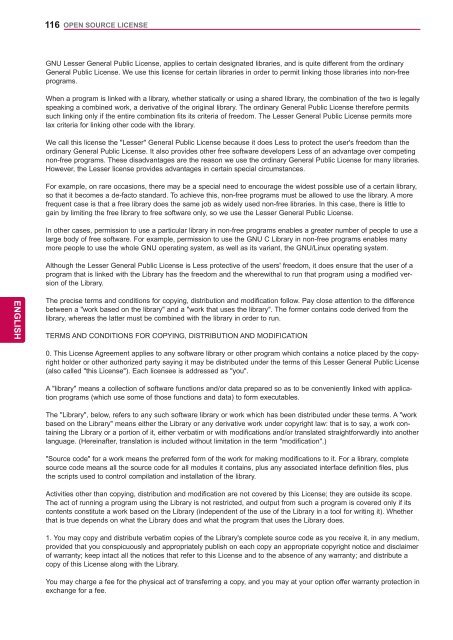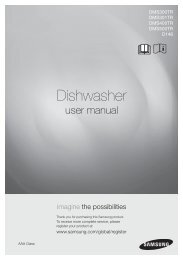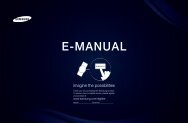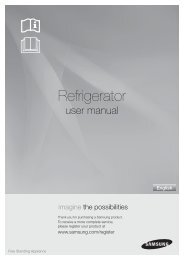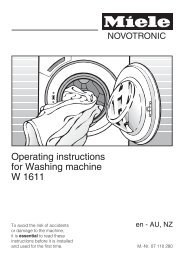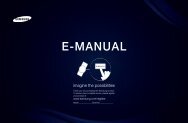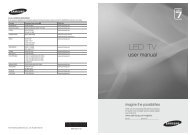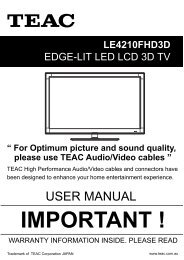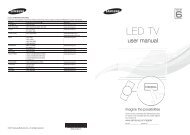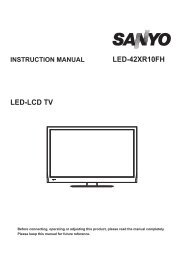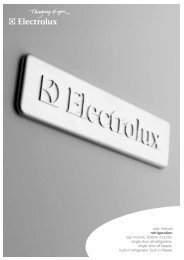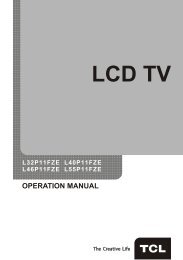LG 60PV250 Product Manual - Comparison.com.au
LG 60PV250 Product Manual - Comparison.com.au
LG 60PV250 Product Manual - Comparison.com.au
Create successful ePaper yourself
Turn your PDF publications into a flip-book with our unique Google optimized e-Paper software.
116<br />
OPEN SOURCE LICENSE<br />
GNU Lesser General Public License, applies to certain designated libraries, and is quite different from the ordinary<br />
General Public License. We use this license for certain libraries in order to permit linking those libraries into non-free<br />
programs.<br />
When a program is linked with a library, whether statically or using a shared library, the <strong>com</strong>bination of the two is legally<br />
speaking a <strong>com</strong>bined work, a derivative of the original library. The ordinary General Public License therefore permits<br />
such linking only if the entire <strong>com</strong>bination fits its criteria of freedom. The Lesser General Public License permits more<br />
lax criteria for linking other code with the library.<br />
We call this license the "Lesser" General Public License bec<strong>au</strong>se it does Less to protect the user's freedom than the<br />
ordinary General Public License. It also provides other free software developers Less of an advantage over <strong>com</strong>peting<br />
non-free programs. These disadvantages are the reason we use the ordinary General Public License for many libraries.<br />
However, the Lesser license provides advantages in certain special circumstances.<br />
For example, on rare occasions, there may be a special need to encourage the widest possible use of a certain library,<br />
so that it be<strong>com</strong>es a de-facto standard. To achieve this, non-free programs must be allowed to use the library. A more<br />
frequent case is that a free library does the same job as widely used non-free libraries. In this case, there is little to<br />
gain by limiting the free library to free software only, so we use the Lesser General Public License.<br />
In other cases, permission to use a particular library in non-free programs enables a greater number of people to use a<br />
large body of free software. For example, permission to use the GNU C Library in non-free programs enables many<br />
more people to use the whole GNU operating system, as well as its variant, the GNU/Linux operating system.<br />
Although the Lesser General Public License is Less protective of the users' freedom, it does ensure that the user of a<br />
program that is linked with the Library has the freedom and the wherewithal to run that program using a modified version<br />
of the Library.<br />
ENGLISH<br />
The precise terms and conditions for copying, distribution and modification follow. Pay close attention to the difference<br />
between a "work based on the library" and a "work that uses the library". The former contains code derived from the<br />
library, whereas the latter must be <strong>com</strong>bined with the library in order to run.<br />
TERMS AND CONDITIONS FOR COPYING, DISTRIBUTION AND MODIFICATION<br />
0. This License Agreement applies to any software library or other program which contains a notice placed by the copyright<br />
holder or other <strong>au</strong>thorized party saying it may be distributed under the terms of this Lesser General Public License<br />
(also called "this License"). Each licensee is addressed as "you".<br />
A "library" means a collection of software functions and/or data prepared so as to be conveniently linked with application<br />
programs (which use some of those functions and data) to form executables.<br />
The "Library", below, refers to any such software library or work which has been distributed under these terms. A "work<br />
based on the Library" means either the Library or any derivative work under copyright law: that is to say, a work containing<br />
the Library or a portion of it, either verbatim or with modifications and/or translated straightforwardly into another<br />
language. (Hereinafter, translation is included without limitation in the term "modification".)<br />
"Source code" for a work means the preferred form of the work for making modifications to it. For a library, <strong>com</strong>plete<br />
source code means all the source code for all modules it contains, plus any associated interface definition files, plus<br />
the scripts used to control <strong>com</strong>pilation and installation of the library.<br />
Activities other than copying, distribution and modification are not covered by this License; they are outside its scope.<br />
The act of running a program using the Library is not restricted, and output from such a program is covered only if its<br />
contents constitute a work based on the Library (independent of the use of the Library in a tool for writing it). Whether<br />
that is true depends on what the Library does and what the program that uses the Library does.<br />
1. You may copy and distribute verbatim copies of the Library's <strong>com</strong>plete source code as you receive it, in any medium,<br />
provided that you conspicuously and appropriately publish on each copy an appropriate copyright notice and disclaimer<br />
of warranty; keep intact all the notices that refer to this License and to the absence of any warranty; and distribute a<br />
copy of this License along with the Library.<br />
You may charge a fee for the physical act of transferring a copy, and you may at your option offer warranty protection in<br />
exchange for a fee.


